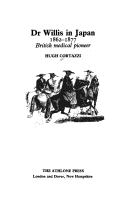| Listing 1 - 10 of 19 | << page >> |
Sort by
|
Book
Year: 2009 Publisher: Hyattsville, MD : U.S. Dept. of Health and Human Services, Center for Disease Control and Prevention, National Center for Health Statistics,
Abstract | Keywords | Export | Availability | Bookmark
 Loading...
Loading...Choose an application
- Reference Manager
- EndNote
- RefWorks (Direct export to RefWorks)
Book
Year: 1879 Publisher: Bruxelles : Librairie H. Manceaux,
Abstract | Keywords | Export | Availability | Bookmark
 Loading...
Loading...Choose an application
- Reference Manager
- EndNote
- RefWorks (Direct export to RefWorks)
Physicians, Foreign --- Foreign Medical Graduates --- Belgium
Book
Year: 2006 Publisher: [Washington, D.C.] : U.S. Government Accountability Office,
Abstract | Keywords | Export | Availability | Bookmark
 Loading...
Loading...Choose an application
- Reference Manager
- EndNote
- RefWorks (Direct export to RefWorks)
Book
ISBN: 9781780935164 Year: 2012 Publisher: London Bloomsbury
Abstract | Keywords | Export | Availability | Bookmark
 Loading...
Loading...Choose an application
- Reference Manager
- EndNote
- RefWorks (Direct export to RefWorks)
Surgeons --- Physicians, Foreign --- Willis, William, --- Japan --- History
Book
Year: 2006 Publisher: [Washington, D.C.] : U.S. Government Accountability Office,
Abstract | Keywords | Export | Availability | Bookmark
 Loading...
Loading...Choose an application
- Reference Manager
- EndNote
- RefWorks (Direct export to RefWorks)
Physicians, Foreign --- Visas --- Medically underserved areas --- Government policy
Book
ISBN: 1472553330 178093517X 9781780935171 9781472553331 Year: 2012 Publisher: London ; New York : Bloomsbury,
Abstract | Keywords | Export | Availability | Bookmark
 Loading...
Loading...Choose an application
- Reference Manager
- EndNote
- RefWorks (Direct export to RefWorks)
"This is a fascinating account of the fifteen years spent in Japan by William Willis, a British medical pioneer. Quite apart from the importance of his reports on medical practice and the spread of Western medicine, Dr Willis, who worked with the British Legation until 1868, was also a notable eye-witness to many historic occasions. Dr Willis's letters to his family in Ireland are quoted extensively. First published in 1985, this title is part of the Bloomsbury Academic Collections series."--Bloomsbury Publishing.
Physicians, Foreign --- Surgeons --- Biography. --- Willis, William, --- Japan --- History

ISBN: 0485112647 Year: 1985 Publisher: London : Athlone press,
Abstract | Keywords | Export | Availability | Bookmark
 Loading...
Loading...Choose an application
- Reference Manager
- EndNote
- RefWorks (Direct export to RefWorks)
Biographies. --- History of medicine --- Physicians --- Physicians, Foreign --- Surgeons --- Asia. --- Biography. --- Biography
Book
Year: 1971 Publisher: Bruxelles : Académie royale des sciences d'outre-mer,
Abstract | Keywords | Export | Availability | Bookmark
 Loading...
Loading...Choose an application
- Reference Manager
- EndNote
- RefWorks (Direct export to RefWorks)
Medicine --- Physicians --- Physicians, Foreign --- Medical assistance --- Tropical medicine --- History. --- Biography. --- Congo (Democratic Republic) --- History
Book
ISBN: 023154829X 9780231548298 9780231189347 0231189346 9780231189354 0231189354 Year: 2020 Publisher: New York
Abstract | Keywords | Export | Availability | Bookmark
 Loading...
Loading...Choose an application
- Reference Manager
- EndNote
- RefWorks (Direct export to RefWorks)
"The United States does not have enough doctors. Every year since the 1950s, internationally trained and osteopathic medical graduates have been needed to fill residency positions because there are too few American-trained MDs. These international and osteopathic graduates have similar or better average track records than their American-trained MD counterparts. But they often end up in lower-prestige training programs, while American-trained MDs tend to occupy elite training positions. Some programs are even fully segregated, accepting exclusively U.S. medical graduates or non-U.S. medical graduates, depending on the program's prestige. How do international and osteopathic medical graduates end up so marginalized, and what allows U.S.-trained MDs to remain elite? Doctors' Orders offers a groundbreaking examination of the construction and consequences of status distinctions between physicians before, during, and after residency training. Tania M. Jenkins spent years observing and interviewing American, international, and osteopathic medical residents in two hospitals to reveal the unspoken mechanisms that are taken for granted and that lead to hierarchies among supposed equals. She finds that the United States does not need formal policies to prioritize American-trained MDs. By relying on a system of informal beliefs and practices that equate status with merit and eclipse structural disadvantages, the profession convinces international and osteopathic graduates to participate in a system that subordinates them to American-trained MDs. Offering a rare ethnographic look at the inner workings of an elite profession, Doctors' Orders sheds new light on the formation of informal status hierarchies and their significance for both doctors and patients"--
Residents (Medicine) --- Physicians, Foreign --- Osteopathic physicians --- Social status --- Elite (Social sciences) --- Social conditions. --- Selection and appointment
Book
Year: 2008 Publisher: [Washington, D.C.] : [U.S. G.P.O.],
Abstract | Keywords | Export | Availability | Bookmark
 Loading...
Loading...Choose an application
- Reference Manager
- EndNote
- RefWorks (Direct export to RefWorks)
Physicians, Foreign --- Admission of nonimmigrants --- Legal status, laws, etc. --- Government policy
| Listing 1 - 10 of 19 | << page >> |
Sort by
|

 Search
Search Feedback
Feedback About UniCat
About UniCat  Help
Help News
News